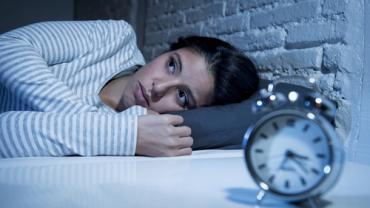
Stress and insomnia are significant root health problems that are becoming as common as PBJ sandwiches are to the American child. The union between these two issues is undeniable, making it increasingly difficult to know which issue to address first. The common description of this marriage is the feeling of being “wired and tired” – the result of chronically high catecholamines and insufficient energy restoration. This phrase has often been used to describe the early stages of the phenomenon formerly known as adrenal fatigue. It now describes the vicious cycle of stress and insomnia, stemming from the more modern concept of HPA dysfunction.
Insomnia and stress are far more common among women, compared to men, and are often seen in those described as possessing type A personalities and who are susceptible to a depressed mood, rumination, chronic anxiety, inhibition of emotions, and inability to express anger. At bedtime, they are characteristically tense, anxious, ruminative about issues associated with health, work, personal affairs, and death. The emotional arousal stemming from these traits causes physiological arousal through both the sympathetic nervous system and the hypothalamic pituitary adrenal (HPA) axis, leading to insomnia.
HPA Activation Causes Insomnia
Physiological and emotional stressors trigger the hypothalamic release of corticotropin-releasing hormone (CRH) which initiates activation of the HPA axis, stimulates the sympathetic nervous system, and acts as a neurotransmitter that further exacerbates fear, anxiety, depression and arousal pathways in the brain. These activities suppress sleep. Not only so, but CRH also impairs sleep by shortening the length of deep, slow-wave sleep, minimizing the energy restoration that occurs during this stage. Shorter sleep and poor sleep quality are also associated with alterations in diurnal cortisol levels and a higher cortisol awakening response.
A prospective, longitudinal study of 2,316 adults with no history of insomnia or depression showed that increased “cognitive intrusions, or the level of perseverative, ego-dystonic ideation elicited by a stressor,” are responsible for delayed sleep onset, increased wake time after sleep onset, and poor sleep quality. Likewise, depression (a psychological stressor) was also strongly associated with insomnia, both as a cause and effect.
Insomnia Causes HPA Activation
Not only can we blame stress for difficulties in sleep patterns, but conversely, we can blame insomnia for increased HPA activity. Every 90 minutes our body cycles through light sleep (stages 1 and 2), followed by deep, slow-wave sleep (stages 3 and 4), and REM sleep. Deep, slow-wave sleep is where energy restoration occurs and the sympathetic nervous system shuts down in favor of calm, parasympathetic activity. Glucocorticoid levels also decrease during deep, slow-wave sleep. Glucocorticoid levels begin to rise again about an hour before you awake and ultimately act to terminate sleep, peaking about 30 minutes after arousal.
Sleep deprivation (and especially inadequate deep, slow-wave sleep) robs the body from its natural reprieve from glucocorticoids, leading to prolonged and intensified HPA activity. Further, sleep deprivation increases CRH and cortisol levels, which have an excitatory action on neuronal tissue and stimulates HPA activity.
Support for HPA Activity and Sleep
When addressing the root problems of insomnia and stress, supporting both issues with botanicals and nutraceuticals can be helpful until sleep quality improves and stressors are either reduced and/or long-term stress management is adopted. Pantothenic acid, niacin, and pyridoxine (vitamin B-6) support the adrenal glands, while the stress response can be temporarily curbed with the calming neurotransmitter, GABA, and its boosters, L-theanine, taurine, and glycine. 5-HTP encourages the natural production of serotonin and melatonin to improve sleep quality. Neurotransmitter transmission, cell-signaling and membrane health and fluidity is enhanced with phosphatidylserine and inositol, especially with stress-induced insomnia. Anxiety and sympathetic activity often initiate tense muscle tone and an inability to relax. Magnesium and botanicals such as German chamomile and lemon balm promote both muscle and mental relaxation. Adaptogenic botanicals such as ashwagandha, rhodiola, and magnolia gently reduce catecholamines and help increase resiliency toward stressors.
Finally, the association between stress and insomnia varies considerably between individuals. Individuals with a heightened perception of and response to stressors are more likely to experience significant insomnia as a result of stress. Therefore, evaluating both the quantity and type of stressors experienced, as well as the response to life stressors is prudent when determining the influence of stress on sleep and vice versa.